Southeast Asian leaders will dissect the impact of the United States (US)-China tariff war this weekend at a Bangkok summit, with Beijing determined to drive forward a trade pact sweeping in 40 percent of global commerce – but excluding America.
Disputes in the flashpoint South China Sea and Myanmar's treatment of Rohingya Muslims are also likely to make the agenda at the two-day Association of Southeast Asian Nations (ASEAN) meeting starting Saturday in the Thai capital.
But commerce will dominate, with the trade war between the world's two biggest economies pushing some major manufacturers to flee China to Southeast Asia and casting doubts over the future of free trade.
US President Donald Trump has imposed tariffs on US$200 billion of Chinese goods, from sneakers and socks to washing machines and furniture, prompting Beijing to hit back with levies on US$60 billion of American imports.
"One of the biggest beneficiaries is ASEAN," said Drew Thompson, a research fellow at the Lee Kuan Yew School of Public Policy in Singapore, in reference to the gains Asia's low-cost manufacturing nations stand to make from trade tensions between China and the US.
Firms including Brooks Running Company and washing machine maker Haier have already started migrating from China, seeking friendlier, lower-tariff markets in Vietnam, Thailand or Indonesia.
With the spat grinding on, Beijing is intensifying its drive to sign a massive trade pact that sweeps in Southeast Asia.
The Regional Comprehensive Economic Partnership (RCEP) includes all 10 ASEAN economies, plus India, Japan, South Korea, Australia and New Zealand.
It links about half the world's population and is seen as a way for China to draft the architecture of Asian-Pacific trade, following a US retreat from the region.
Shortly after his election, Trump pulled the US from the Trans Pacific Partnership (TPP) – which would have been the world's largest trade deal – slamming it as an American "job killer".
'Bad news for everyone'
Backers hoped to sign the RCEP deal by the end of this year.
But negotiations have become sticky with Australia and New Zealand pushing for "high quality" environmental and labour protections.
India is also seeking guarantees the deal will not force its market open to duty-free goods from its main economic rival China through Southeast Asia.
In seeking to draw its own perimeters, New Delhi is the "glaring objector" to the free trade deal, Thompson added.
Expectations of concrete progress in Bangkok have dimmed – although RCEP negotiators are scheduled to meet on Saturday.
In the absence of a deal, observers worry the short-term gains for ASEAN from the US-China trade war may soon be consumed by falling global growth rates.
"If China and the US continue and the world economy suffers... then it's just bad news for everybody," Fred Burke, managing partner at law firm Baker McKenzie in Vietnam, which specialises in investment, said.
Sea squabbles, Rohingya returns
As usual, bitter disputes over competing claims in the South China Sea are likely to surface in Bangkok after a collision between a Filipino and Chinese ship in the resource-rich waterway.
Some officials in Manila initially blamed Chinese sailors for deliberately ramming the boat and leaving Filipino fishermen stranded at sea.
But Philippines President Rodrigo Duterte this week downplayed the incident, saying it was "just a collision".
The flashpoint highlights the urgent need for toughened-up terms in a Code of Conduct for clashes between fishermen at sea, said Manila-based security analyst Richard Heydarian.
"If the Chinese don't rein in these fishermen... this is just going to get worse," he said.
Myanmar may also face pressure over the stalled repatriation of Rohingya Muslims, currently living in camps in Bangladesh, after more than 740,000 of the persecuted minority fled a 2017 army crackdown in Rakhine state.
The country's de facto leader Aung San Suu Kyi is expected in Bangkok as is Malaysian premier Mahathir Mohamad who has previously broken diplomatic protocol by criticising a fellow ASEAN leader.
An upbeat ASEAN report leaked this month was criticised for predicting that half a million Rohingya will soon return, failing to use the word "Rohingya" and glossing over ongoing violence in Rakhine.
"ASEAN needs to stop turning a blind eye to Myanmar’s atrocities against the Rohingya," said Eva Sundari, an Indonesian MP and a board member of the ASEAN Parliamentarians for Human Rights.
Campaigners are also urging ASEAN leaders to tackle the mounting problem of plastic and electronic waste – much of it imported from Western nations and accumulating in Southeast Asia.
Greenpeace this week said the region has become "the world's new dumpsite". - AFP
